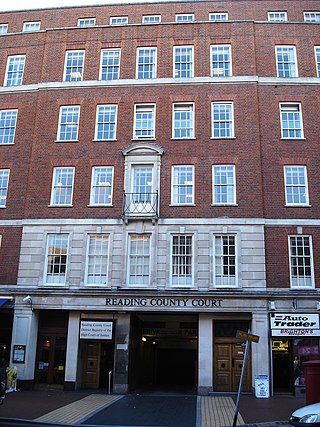Related Research Articles

Copyhold was a form of customary land ownership common from the Late Middle Ages into modern times in England. The name for this type of land tenure is derived from the act of giving a copy of the relevant title deed that is recorded in the manorial court roll to the tenant; not the actual land deed itself. The legal owner of the manor land remained the mesne lord, who was legally the copyholder, according to the titles and customs written down in the manorial roll. In return for being given land, a copyhold tenant was required to carry out specific manorial duties or services. The specific rights and duties of copyhold tenants varied greatly from one manor to another and many were established by custom. By the 19th century, many customary duties had been replaced with the payment of rent.
The Popery Act of 1704 required land owned by Roman Catholics to be divided equally between all a landholder's sons, both legitimate and illegitimate, on his death. This had formerly been normal under the law of gavelkind, a law abolished by the Dublin administration in 1604. Known as sub-division, this inheritance practice continued by tradition until the middle of the 19th century.

Enclosure or inclosure is a term, used in English landownership, that refers to the appropriation of "waste" or "common land" enclosing it and by doing so depriving commoners of their rights of access and privilege. Agreements to enclose land could be either through a formal or informal process. The process could normally be accomplished in three ways. First there was the creation of "closes", taken out of larger common fields by their owners. Secondly, there was enclosure by proprietors, owners who acted together, usually small farmers or squires, leading to the enclosure of whole parishes. Finally there were enclosures by Acts of Parliament.

A tenant farmer is a person who resides on land owned by a landlord. Tenant farming is an agricultural production system in which landowners contribute their land and often a measure of operating capital and management, while tenant farmers contribute their labor along with at times varying amounts of capital and management. Depending on the contract, tenants can make payments to the owner either of a fixed portion of the product, in cash or in a combination. The rights the tenant has over the land, the form, and measures of payment vary across systems. In some systems, the tenant could be evicted at whim ; in others, the landowner and tenant sign a contract for a fixed number of years. In most developed countries today, at least some restrictions are placed on the rights of landlords to evict tenants under normal circumstances.

The Irish National Land League, also known as the Land League, was an Irish political organisation of the late 19th century which organised tenant farmers in their resistance to exactions of landowners. Its primary aim was to abolish landlordism in Ireland and enable tenant farmers to own the land they worked on. The period of the Land League's agitation is known as the Land War. Historian R. F. Foster argues that in the countryside the Land League "reinforced the politicization of rural Catholic nationalist Ireland, partly by defining that identity against urbanization, landlordism, Englishness and—implicitly—Protestantism." Foster adds that about a third of the activists were Catholic priests, and Archbishop Thomas Croke was one of its most influential champions.

A lease is a contractual arrangement calling for the user to pay the owner for the use of an asset. Property, buildings and vehicles are common assets that are leased. Industrial or business equipment are also leased. Basically a lease agreement is a contract between two parties: the lessor and the lessee. The lessor is the legal owner of the asset, while the lessee obtains the right to use the asset in return for regular rental payments. The lessee also agrees to abide by various conditions regarding their use of the property or equipment. For example, a person leasing a car may agree to the condition that the car will only be used for personal use.
A leasehold estate is an ownership of a temporary right to hold land or property in which a lessee or a tenant has rights of real property by some form of title from a lessor or landlord. Although a tenant does hold rights to real property, a leasehold estate is typically considered personal property.
The Land Acts were a series of measures to deal with the question of tenancy contracts and peasant proprietorship of land in Ireland in the nineteenth and twentieth centuries. Five such acts were introduced by the government of the United Kingdom between 1870 and 1909. Further acts were introduced by the governments of the Irish Free State after 1922 and more acts were passed for Northern Ireland.

Land reform in Scotland is the ongoing process by which the ownership of land, its distribution and the law which governs it is modified, reformed and modernised by property and regulatory law.
The Tenant Right League was a federation of local societies formed in Ireland in the wake of the Great Famine to check the power of landlords and advance the rights of tenant farmers. An initiative of northern unionists and southern nationalists, it articulated a common programme of agrarian reform. In the wake of the League's success in helping return 48 pledged MPs to the Westminster Parliament in 1852, the promised unity of "North and South" dissolved. An attempt was made to revive the all-Ireland effort in 1874, but struggle for rights to the land was to continue through to the end of the century on lines that reflected the regional and sectarian division over Ireland's continued place in the United Kingdom.

William Sharman Crawford (1780–1861) was an Irish landowner who, in the Parliament of the United Kingdom, championed a democratic franchise, a devolved legislature for Ireland, and the interests of the Irish tenant farmer. As a Radical representing first, with Daniel O'Connell's endorsement, Dundalk (1835-1837) and then, with the support of Chartists, the English constituency of Rochdale (1841–1852) he introduced bills to codify and extend in Ireland the Ulster tenant right. In his last electoral contest, standing on the platform of the all-Ireland Tenant Right League in 1852 he failed to unseat the Conservative and Orange party in Down, his native county.

An assured tenancy is a legal category of residential tenancy to an individual in English land law. Statute affords a tenant under an assured tenancy a degree of security of tenure. A tenant under an assured tenancy may not be evicted without a reasonable ground in the Housing Act 1988 and, where periodic changes in rent are potentially subject to a challenge before a rent assessment committee.

Street v Mountford[1985] UKHL 4 is an English land law case from the House of Lords. It set out principles to determine whether someone who occupied a property had a tenancy, or only a licence. This mattered for the purpose of statutory tenant rights to a reasonable rent, and had a wider significance as a lease had "proprietary" status and would bind third parties.

Errington v Wood[1951] EWCA Civ 2 is an English contract law and English land law judicial decision of the Court of Appeal concerning agreement and the right to specific performance of an assurance that is relied on.
Gladstone v Bower [1960] 2 QB 384 was a 1959 case in the English Court of Appeal, concerning security of tenure in tenancies of agricultural holdings. It arose from what was then thought to be a lacuna in the Agricultural Holdings Act 1948.

The Agricultural Holdings Act 1995 is an Act of the Parliament of the United Kingdom which applies to England and Wales. It is in force. The Act reformed and substantially deregulated the law relating to agricultural tenancies, and has had the dual effects of increasing the amount of land available to rent in the agricultural sector, and increasing the average rent per acre charged.
The history of rent control in England and Wales is a part of English land law concerning the development of rent regulation in England and Wales. Controlling the prices that landlords could make their tenants pay formed the main element of rent regulation, and was in place from 1915 until its abolition by the Housing Act 1988.

The Housing Act 1988 is an Act of Parliament in the United Kingdom. It governs the law between landlords and tenants. The Act introduced the concepts of assured tenancy and assured shorthold tenancy. It also facilitated the transfer of council housing to not-for-profit housing associations, which was then carried out partly through the system of Large Scale Voluntary Transfer.

The Housing and Planning Act 2016 is Act of Parliament in the United Kingdom that makes widespread changes to housing policy and the planning system. It introduces legislation to allow the sale of higher value local authority homes, introduce starter homes and "Pay to Stay" and other measures intended to promote home ownership and boost levels of housebuilding. The Act has been subject to a number of criticisms by those opposed to the loss of social housing promoted, the extension of right-to-buy to housing associations and possible work disincentives under "Pay to Stay".
The Evesham Custom is a distinctive form of customary leasehold tenure used in the market gardens of Evesham, Worcestershire. It is the most well-known of a number of former local practises, such as the Ulster Custom and North Lincolnshire Custom. The underlying principle of such customs was that the tenant could be granted compensation for any improvements they made to the land they leased, since the common law did not provide any such protection.
References
- 1 2 One or more of the preceding sentences incorporates text from a publication now in the public domain : Chisholm, Hugh, ed. (1911). "Tenant-right". Encyclopædia Britannica . Vol. 26 (11th ed.). Cambridge University Press. p. 613.
- ↑ Tenant Rights Lawyer